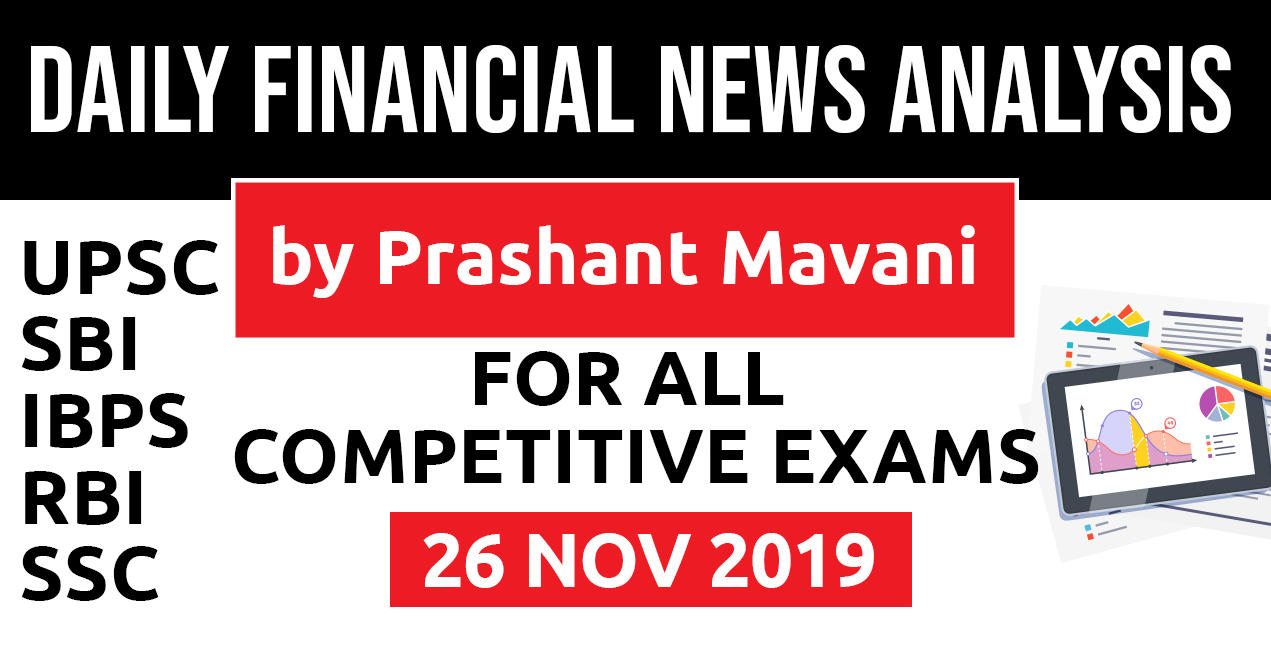Table of Contents
IFSC and tax bills
- Nirmala Sitharaman introduced the Taxation Laws (Amendment) Bill, 2019, in the Lok Sabha.
- This bill is to replace an Ordinance slashing corporate tax rates.
- The Taxation Laws Bill would amend the Income Tax Act, 1961, and the Finance Act, 2019, to give effect to these changes, among others.
- Also, International Financial Services Centre Authority Bill, 2019 was introduced.
- This bill provides for the establishment of an authority to develop and regulate the financial services market in the IFSCs such as GIFT City in Gujarat.
- All powers relating to regulation of financial products, services, and institutions in IFSCs, which were previously exercised by the respective regulators will be exercised by the Authority.
- Currently, the banking, capital markets and insurance sectors in IFSCs are regulated by multiple regulators i.e. RBI, Sebi, Irdai and PFRDA.
- The dynamic nature of businesses in the IFSCs necessitates a high degree of inter-regulatory coordination.
Minimum Balance Penalty
- Public sector banks collected Rs 1,996.46 crore in penalty from customers.
- This is for not keeping minimum monthly balance in savings account in 2018-19.
- 2017-18: Rs 3,368.42 crore
- 2016-17: Rs 790.22 crore
- Government: banks do not levy any such penalty on basic savings bank accounts (BSBD) including those opened under Pradhan Mantri Jan Dhan Yojana.
- Till March-end 2019, there were 57.3 crore BSBD accounts across the country, including 35.27 crore Jan Dhan accounts, as per RBI.
- Banks must ensure that such charges are reasonable and not out of line with the average cost of providing these services, as per RBI guidelines.
Shell Companies
- The CBI detected 894 shell companies while probing 108 cases in the last four years.
- The agency also registered 30 cases against 104 shell companies during the period.
- Some of the shell companies and persons were involved in more than one case.
Aadhaar
- Report by advisory group Dalberg and investment firm Omidyar Network India.
- Aadhaar is becoming ubiquitous in India with 90 percent of people trusting their data is safe.
- 95% adults & 75% children have Aadhaar.
- 90 percent of people incorrectly believe that providing the unique identity number is mandated by law for bank accounts.
- “A notable minority” of 28 million adults, mostly in Assam and Meghalaya where enrolment has been slow due to questions about legal residency among others, still do not have Aadhaar.
- Most Indians use Aadhaar once a month on average, with a majority experiencing better delivery of services.
- For 8 per cent of people, Aadhaar was their first-ever ID.
- One in hundred among MGNREGS job card holders did not get work the last time they tried due to Aadhaar-related issues.
- 0.5 percent of social pension beneficiaries did not receive their pension the last time they expected it due to problems with Aadhaar.
- The report said an estimated 102 million people still do not have Aadhaar.
- Amongst vulnerable groups, 30% of homeless and 27% of third gender residents, do not have Aadhaar.
- Only 39 percent of residents have the correct mobile phone number linked to their Aadhaar.
WhatsApp & Startup India
- WhatsApp partners with Startup India, and is investing $250,000 into the Indian startup ecosystem.
- WhatsApp will provide 500 startups in India with $500 each of Facebook ad credits.
- Indian entrepreneurs are at the forefront of bringing impactful socio-economic change.
- The Facebook ad credits can be used by startups to create ads, and invite customers to click to open a chat on WhatsApp, such as to deepen connections and increase sales using the platform.
- The company said, out of 5 million businesses around the world, a million in India are actively using the WhatsApp Business app to connect with their customers
- To qualify for the Facebook ad credits, the startup must be recognized by the Department for Promotion of Industry and Internal Trade under the Ministry of Commerce.
- It should be at an early stage or at a scalable stage to secure the investment.
India-US trade talks
- India and the US have identified almost 40 products like pistachios, walnuts and apples that can be considered for duty concessions..
- The two sides are also trying to zero in on workable concessions for medical devices.
- Washington is also said to have asked New Delhi to reduce the import duty on pulses.
- The US, along with Canada and Australia, had moved the World Trade Organization (WTO) against India’s ban on import of certain pulses to check falling prices in the domestic market.
- Goyal has said that protecting the farming community and religious sensitivities while importing products having animal feed in their food chain are the red lines in India’s trade negotiations with the US.

Q1 Identify key indicators that will be used to rank states in Export Preparedness Index.
- Business Environment
- Transport connectivity
- Access to finance
- Export infrastructure
Choose the correct option
- Only 1 and 2
- Only 2 and 3
- Only 3 and 4
- All 1,2,3 and 4
Q2 Recently, India has started Visa on Arrival facility for the citizens of which of the below given nation?
- UAE
- Saudi Arabia
- Indonesia
- Sweden
Download Free PDF






















 WhatsApp
WhatsApp